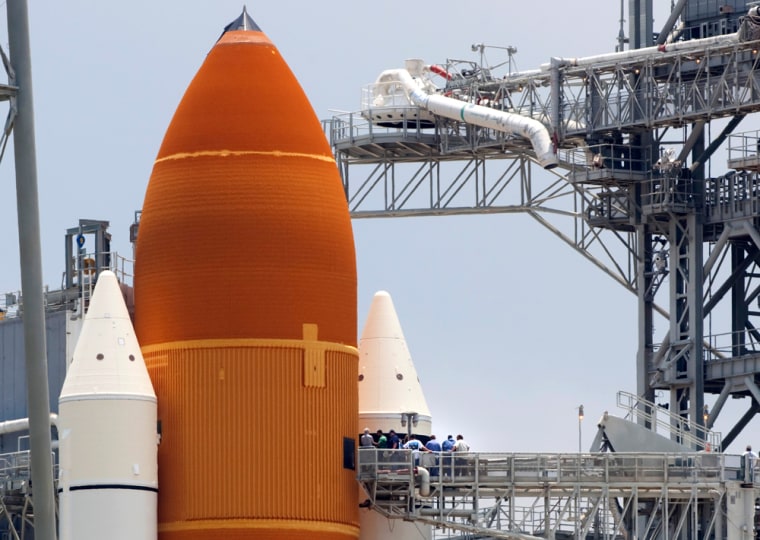NASA will try to launch the space shuttle Endeavour again Wednesday, after repairing a hydrogen gas leak that thwarted the first attempt.
Top officials decided Monday to bump an unmanned moon mission so Endeavour could have another shot at flying to the international space station. The delayed moon mission is NASA’s first in a decade and is critical to the space agency’s long-term effort to return humans to the lunar surface.
The Atlas 5 rocket had been scheduled to blast off Wednesday with a pair of lunar probes — a moon-mapping orbiter and a craft meant to crash into a shadowed crater at the moon’s south pole. That launch is now scheduled for no earlier than Thursday; it would slip to Friday if the shuttle countdown proceeds trouble-free into early Wednesday.
“If you’ve spent any time on the Space Coast and monitoring launches, you notice that they tend to attract each other, and we’ve got that very situation here,” said Chuck Dovale, launch director for the moon mission.
NASA ended up having to choose between the two missions because Endeavour could not launch this past Saturday. The potentially dangerous hydrogen gas leak in the vent line leading to the shuttle’s external fuel tank halted the countdown.
It was the same kind of leak that stalled a shuttle flight back in March. Technicians finished the repairs Monday, replacing the vent line hookup and a pair of seals.
The launch is scheduled for 5:40 a.m. ET Wednesday. Forecasters put the odds of good weather at 80 percent.
NASA is giving Endeavour just one chance, on Wednesday, to get off on its space station construction mission before making way for the moon shot.
Each mission faces a tight launch schedule.
Endeavour and its crew of seven must be flying by this weekend, otherwise it will have to wait until mid-July. That’s because of unfavorable sun angles that would heat the shuttle too much while it is docked to the space station.
Delaying Endeavour’s 16-day trip until July would end up postponing the next few shuttle missions and, as a result, make it harder for NASA to complete its eight remaining missions by the end of next year. That’s the deadline imposed by the White House so NASA can focus on its next spaceship, intended to carry astronauts to the moon by 2020.
NASA’s newest moon probes, on the other hand, need to be launched by Saturday. Otherwise, the space agency will have to wait until the end of June before trying again. Waiting that long would complicate the moon-impacting craft’s flight and use more fuel.
Dovale said the moon mission — combining the Lunar Reconnaissance Orbiter and the Lunar Crater Observation and Sensing Satellite, or LCROSS — will be ready to lift off as early as Thursday, if NASA falls behind in its shuttle launch countdown.
If Endeavour has to step aside for the moon shot, that would bump the shuttle flight into July unless it was shortened, an unappealing option for the space station program, said NASA test director Steve Payne. The Air Force needs two days to switch its launch-monitoring systems from one type of rocket to another.
Endeavour and its astronauts will deliver and install the last piece of Japan’s space station lab and drop off hundreds of pounds of food for the six space station residents. Five spacewalks are planned.
Once the shuttle docks, there will be 13 people together in space for the first time ever.
More on Endeavour | international space station
